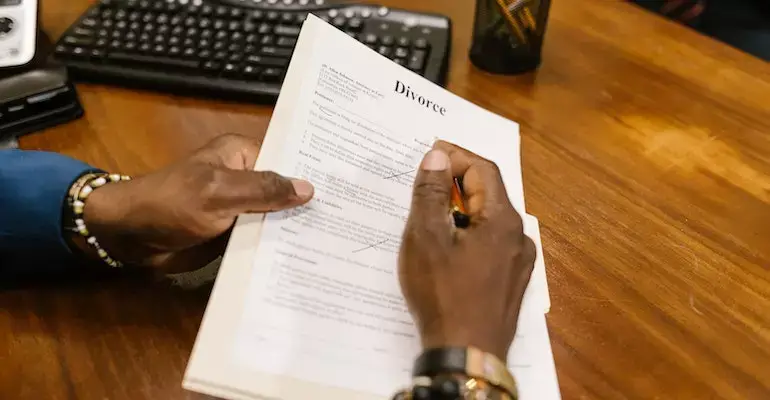My friend Jessica who is going through a divorce, recently met me at my office, and there she told me, “My husband lied on divorce papers. I’m so frustrated and don’t know what to do.“
As Jessica spoke, my heart went out to her. Having worked with many clients during their divorce proceedings, I’ve heard stories of spouses lying on divorce papers before. Lying is never a good idea in a court of law. It can damage both parties long term, especially if it’s discovered during a trial. But if you find yourself in Jessica’s shoes, don’t worry! Here are 7 easy ways to deal with your husband lying on divorce papers:

My Husband Lied on Divorce Papers: 7 Things You Can Do to Deal with It
I’m not a legal expert, but I can offer some general advice on what you might consider doing if you believe your husband lied on divorce papers. Remember that it’s crucial to consult with a qualified attorney for personalized advice that fits your situation. Here are seven steps you could consider:
#1. Talk to your husband:
How do you deal with a lying spouse during divorce?
Talking with the spouse about the issue is the best way to deal. If your husband has lied on divorce papers, the first thing you can do is talk to him. Find out why he did it and what his motivation was. Here, you must be calm, no matter how difficult, and have an open-minded conversation.
Also, you can ask your husband to reconsider his decision and admit the truth in the papers. If he agrees, it’s an excellent start for you both. Tell him you don’t want to fight and that the truth is important.
#2. Keep records:
As you prepare your case, keep records of all relevant documents and data securely in one place. These must include court orders, financial statements, emails, and text messages – any record that demonstrates the truth of what happened during your divorce. Carefully preserving these records will be crucial if you decide to prove that your husband was being untruthful on his paperwork.
Additionally, maintain a log of all communication between yourself and him; this includes call records and electronic correspondence such as emails or texts. Falsifying divorce documents is a serious crime to the court.
#3. Prepare evidence:
When you’ve collected all the paperwork and records, it’s time to prepare the evidence that your husband lied in his divorce papers. You can prove that his statements are false or unfounded by providing bank statements, tax returns, emails, text messages, and other documents as proof.
Additionally, talking to those who have direct knowledge of him could lead to comments he made, which serve as even more substantial vindication for your case – they might just be able to hear what proves he wasn’t being truthful on those forms!
#4. Get a lawyer:
Hire an attorney who has experience and specializes in divorce cases. Ask for referrals from friends and family, or search online for reviews of each lawyer you are considering. To ensure the best outcome for your case, choose a lawyer who is well-versed in the laws governing your state’s divorce proceedings.
Having a lawyer by your side is essential for the process of my husband’s lies on divorce papers. Your lawyer can provide advice, direction, and representation in court should you decide to pursue legal action against him.
#5. Negotiate:
Consider negotiating with him once you have evidence that your husband has lied. If you can come to an agreement without court intervention, it will save you time and money in the long run. My client Jessica recently could solve the problem with her divorced husband, who was refusing to sell the house after the divorce. You should also try to discuss it with him. If needed, you may take help from mediators.
Before negotiating with my husband, think about a fair outcome for both of you. This may include modifications to custody arrangements or alterations to financial settlements. Discuss the options with your lawyer before attempting to negotiate with my husband’s lies on divorce papers.
#6. File a countersuit:
You could try filing a countersuit against your spouse for lying on the divorce papers. This is done by presenting evidence that he lied and asking the court to amend or throw out documents as a result. You must present your evidence in court and argue why my husband’s lies should be disregarded.
However, this can be costly, time-consuming, and emotionally draining, so make sure you are prepared for what could come with filing a countersuit. Lying on court documents and providing incorrect information on divorce papers are considered serious issues by the court.
#7. Seek emotional support:
The emotional toll of realizing your husband lied on divorce papers can be heavy. Seek out the help and support you need by consulting a qualified therapist or counselor- they are equipped to provide clarity and insights that could prove invaluable during this difficult time. Talking with a professional will allow you to overcome these challenging emotions in order to move forward successfully.
Talking to someone who understands the law related to the fact could also be beneficial as you navigate this situation. Many offer free initial consultations and may provide a helpful outside perspective to help make sense of the legalities involved in my husband lying on divorce papers.
Some FAQS on My Husband Lying on Divorce Papers
How do I prove my husband is lying during our divorce?
Proving that your husband is lying during a divorce can be challenging, but there are steps you can take to gather evidence and present your case effectively. Here are some suggestions:
- Document everything: Keep a detailed record of any communication with your spouse, including emails, text messages, and phone calls. Also, make notes about any verbal discussions or agreements.
- Gather financial records: Obtain copies of all relevant financial documents, including bank statements, tax returns, pay stubs, property deeds, and investment statements. Analyze these records for any discrepancies or hidden assets.
- Hire a private investigator: In some cases, hiring a private investigator can help gather evidence to support your claims. They can conduct surveillance or investigate specific aspects related to the divorce.
- Obtain witness statements: If there are individuals who can corroborate your claims or have firsthand knowledge of your spouse’s dishonesty, consider asking them to provide written or sworn statements.
- Request discovery: Through your attorney, you can use the legal discovery process to obtain relevant information and documents from your spouse. This may include written questions (interrogatories), requests for the production of documents, and depositions.
- Subpoena records: If you believe there is information held by third parties, such as financial institutions or employers, that can expose your spouse’s dishonesty, your attorney can issue subpoenas to request those records.
- Use social media cautiously: Social media can sometimes be a source of evidence, but be careful about how you use it. Avoid violating privacy laws and consult your attorney before using social media posts as evidence.
- Consult with experts: In addition to gathering evidence, consult an attorney with experience in family law matters. An experienced lawyer will know how best to present the evidence to hold up in court so that the truth about the deception can be exposed to all parties involved. They will also provide support throughout the process and ensure one’s rights are protected at every stage.
- Attend court hearings: Be present and engaged during court hearings to challenge any false claims made by your spouse. Having a credible and knowledgeable attorney to represent you is essential during this process.
Finally, remain composed throughout the proceedings and not show anger towards one’s spouse while they are testifying under oath during your divorce hearing. Losing control during these proceedings will likely only weaken one’s case against them; remaining calm and rational while addressing conflicting testimony serves both justice and oneself better than lashing out with accusations or emotions would do otherwise. Additionally, you may watch this video to prove someone is lying in divorce court:
What happens if you lie under oath during your divorce trial?
If you are found to have lied under oath during a divorce trial in the United States, the consequences can be severe. Lying under oath is considered perjury, a crime in all 50 states, and carries serious penalties.
Depending on your state’s laws, lying under oath can result in criminal prosecution and conviction. If convicted of perjury, you may face fines, jail time, or both. Furthermore, if a court finds out that you lied during the trial process, they could choose to award an unfavorable ruling against you due to your dishonesty.
For instance, if one spouse lies about assets or income discrepancies discovered during the trial process, this information could be used against them when dividing marital property or determining alimony payments. Ultimately, lying under oath can have major consequences that impact your life and divorce proceedings.
Can lying cause divorce?
Yes, and it can have a lasting effect on both parties. Studies show dishonesty and deception are among the leading causes of divorce, especially in long-term relationships. This is because couples may find it hard to rebuild trust after one partner has lied or withheld important information. When things like infidelity and financial problems come into play, it can be very difficult for couples to work through the issues arising from lies and deception.
In addition to this, lying can cause an increase in arguments between couples who were otherwise happy together. Arguments can start due to the lack of trust created by lies, which can cause stress, leading to more arguments. This vicious cycle will eventually wear away in the relationship until nothing is left for the couple, and a divorce becomes inevitable.
A partner’s inability or unwillingness to tell the truth, can also breed resentment in their partner as they feel betrayed by not being told what is going on, leading them not to believe anything else their partner says and making it harder for them to repair any damage done.
Moreover, hiding secrets from one another tends to lead people away from being completely honest with themselves and their partners. This lack of self-awareness often turns into an unwillingness or inability to acknowledge mistakes or admit wrongdoing, making matters worse when trying to mend a fractured relationship caused by lying.
Without admitting these mistakes and accepting responsibility, it is much harder for couples who have experienced serious hurt due to lying in their marriage to make amends with one another and move forward together honestly.
All of this shows that lies have the potential power to destroy marriages beyond repair if both parties don’t commit fully to addressing underlying issues brought about by dishonesty and restoring their relationship back into a healthy state again.
What is the penalty for hiding assets in the divorce?
The penalty for hiding assets in divorce varies depending on the state and can range from fines to imprisonment. In some states, hiding assets during a divorce is considered perjury and may lead to criminal charges.
In addition, courts may order the person who has hidden or misappropriated marital funds during a divorce case to pay three times the amount they have hidden or misappropriated as punitive damages. In most US states, hiding assets in divorce proceedings is illegal. Hiding marital assets can lead to numerous legal complications, including contempt of court rulings, fines, and even jail time.
Courts typically consider hiding assets fraud and will not hesitate to punish those who attempt to hide their marital property or income from their spouse during a divorce proceeding. This includes looking for offshore accounts and any type of asset, such as cash, real estate, investments, businesses, retirement accounts, and more.
When determining an appropriate penalty for hiding assets during a divorce case, every state has its own laws and guidelines for such matters. Depending on the severity of the crime committed by the party accused of hiding their assets could result in stricter penalties than if no evidence was found at all.
For example, If a party intentionally hid their assets with malicious intent, then this could result in increased fines and potential jail time if proven guilty beyond a reasonable doubt. On the other hand, if a party simply made an honest mistake while filing paperwork, they could face lesser penalties such as fines or being ordered to return any hidden funds that can be located and identified.
Overall, when it boils down to it, concealing assets in a divorce can result in legal repercussions that are far costlier than expected for both parties involved. This is due to the fines resulting from such an act and the additional lawyer fees related to poring through financial documents trying desperately to uncover any records or missing items that have been disguised during filling paperwork and trial prep.
Ultimately what matters most is that both parties are completely truthful with each other regarding their respective financial situations so that everyone gets fair representation throughout the entire process ensuring justice is served accordingly.
What if the husband hides money during a divorce?
If a husband chooses to hide money from his wife during a divorce, it can become a complex situation with various legal implications. Depending on the laws in the state where the divorce occurs, there may be certain rules and regulations about how assets must be divided.
If a husband attempts to conceal or hide marital assets prior to, during, or after a divorce, he may be charged with fraud. Furthermore, if any false statements are made regarding marital property during this process, the court may view it as perjury.
Forensic accountants can help locate missing funds in cases like these by examining financial documents and records that are likely related to the case. They can also look for evidence of money transfers between accounts or other suspicious activity related to finances. Additionally, they can analyze past tax returns and bank statements.
If money has been hidden abroad in an effort to avoid paying spousal support or having it divided up in the case of a divorce proceeding, then bringing those funds back into the United States may require additional steps such as obtaining special permits from foreign governments or engaging in specialized international banking procedures.
Depending on the amount being transferred and how far away it is located worldwide, attempting such actions could prove challenging and costly for all parties involved. Both spouses involved in a divorce should understand their legal rights when dividing assets and income to ensure fairness and equity between them both.
It is very unwise for either party to try hiding money from the other as there can be serious consequences if caught doing so by the court system or through audited financial investigations conducted by forensic accountants hired by either spouse’s lawyer during their divorce proceedings.
What happens if you lie about separation date?
You may face severe repercussions if you lie about your separation date on a divorce document. Depending on the state in which you live, lying about the date of separation can be considered perjury. Perjury is a crime and could result in fines or even jail time.
Most states also have anti-fraud statutes that protect parties from false statements made by either spouse during a divorce. If you are found to have lied on your divorce papers, the court may award sanctions against you or even dismiss your entire case.
Conclusion on my husband lying on divorce papers:
My husband lying on divorce papers can be a difficult and frustrating process to handle. However, you can protect yourself and your interests during the proceedings with the right steps.
Collecting evidence, negotiating with my husband or filing a lawsuit, getting an experienced lawyer, and seeking emotional support are all essential steps to take when my husband lies on divorce papers. Taking a proactive approach can leave the process with your rights intact.






